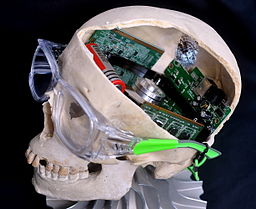"Do I contradict myself? Very well then, I contradict myself. I am large, I contain multitudes."
People of the developed world, we don't live in a meritocracy. I know you're all looking over your left shoulder at that Swede and thinking I am only addressing him, but I assure you that I am talking to the Americans gathered here as well. In fact, I'm looking right at you and if the Swede hears me it's because he happens to be within ear shot. Capitalist societies don't produce meritocracies. The ideas are contradictory. If you like capitalism that is fine and probably healthy, but don't walk around announcing that blue and red are the same color. People might start thinking you're some kind of genius, and we wouldn't want that would we? The moment the rest of the world starts calling you a genius, you've lost all credibility.
I would define a "meritocracy" as a society where the people at the top are there because of the innate value of their abilities. This is a bit of a vague definition, and in some very broad sense meritocracy is synonymous with civilization. There is anarchy, which by definition cannot exist (ref. William Golding), and meritocracy, which is everything else and thus all there is. What I mean is that life, whether lived in the trees or in Manhattan, is nasty, brutish and short. Our fortunes are governed by some form of selection, natural or otherwise. If one defines "ability" as aptitude for whatever skill spells survival in the current death match, then of course the people at the top are those most well endowed with this skill.
One may scoff and ask whether being born to the right family counts as aptitude. In small doses it is true that many past and present societies have structures allowing some of their most unwitting citizens to assume fame, power and fortune. Europe has its royals and America has its Congress. Though in defense of Congress, they are only slightly less effective than monarchy and much less prone to hemophilia. This situation is not sustainable, however. Since there is no such thing as absolute power unless you are from Krypton, even the grandest duchess will have to resort to Machiavellian measures to maintain power. L'etat c'est vous? If so, then why did you find the need to demolish provincial fortresses and build Versailles? Sometimes you have to admire the innate ruthlessness of those born to the throne and yet driven mad by the very real threat of loosing it. That's right, there is no anarchy and no absolute power, only meritocracy filling the negative space between two imaginary regimes.
However, to make the discussion meaningful, we'd probably like to define meritocracy more narrowly. We have to, if we're planning on boasting that we live in a society where merit is the measure of value. Kings raised their princes to believe they were appointed by God and had no issue with the idea that some people were born specialer than others. This didn't remove the very real need to wheel and deal, which wouldn't be necessary with God on your side, but the attitude represents a level of comfort with primogeniture that drives modern man mad. We're all libertarians now and we don't like the idea that we were born with a leg up or that anyone wanted to help us. For starters, that would mean having to share and help others, which lord knows is a habit we gave up in kindergarten. Such a thought would also mean believing that we are not the arbiters of our own fate and that we do not live in a society that empowers all of its citizens equally.
Thus, we refine the concept of merit as a measure of value. Who decides value? Well, if I started out with nothing and became successful, then of course whatever it is I did to make that happen is valuable. Since I believe I rose on the backs of impersonal forces, without the help of anyone with a personal interest in me, I can point to my anonymous peers and say that they have assigned me my worth. We live in a democracy where people are free to elect whom they choose, assuming they are rich enough to avoid working through voting day and white enough to own voter Id cards. We also live in a capitalist economy, where people are free to give their money to whomever they want, assuming that someone has convinced us that what is for sale fulfills an aching need. Most of the time it doesn't, unless you include psychological needs. In this case, yes everything we buy we need desperately to prop up our identities. And that is why we buy into the ultimate shill, the fictional capitalist meritocracy. Like the White Queen, we want to believe six impossible thoughts before breakfast.
Consider this: The Dove Sketches Beauty Scam. It's a dissertation on the nature of the long con. When you're going for broke, you make it appear as though you're giving up the game. A reformed criminal is always more appealing that a man who has stayed out of trouble his whole life. Likewise, we are easily impressed by an ad that doesn't sell anything. Tigers don't change their stripes and major consumer products companies don't pay for advertising without a game in mind. You know this, you aren't stupid, but the power of the long con is that there are too many redirections along the way to keep track of where it's going. In the end, we have a system where value is determined by the masses and mined from their deepest desires, but under the control of those who know better. As the above linked article points out, ads such as these depend on making you feel empowered, which you want, while at the same time giving you an authority to validate your identity, which you need though you may deny it. The authority, therefore, remains, though it is camouflaged. It has to do more work to project its power, but it has never gone away. There are no anarchies and you don't live in a meritocracy. Neither one would be very appealing.
Once upon a time there was a system called communism, and it was horrific. God, it was just awful, we all know that. What is the defining feature of communism? I suppose there were many, but one that strikes me is that it was a true meritocracy. In order for something to exist, there has to be a univocal definition of merit and a centralized means of enforcing that. The only way that can happen is when the state owns all the means of production and a single party system owns the state. That's what you're getting if you claim you want to live in a meritocracy. What we live in is a market economy, where value is rooted in what we can make people believe they are buying into of their own free will and under the control of an ever shifting balance of power among that various forces that want to create that value. I'm not suggesting that communism is a good thing. I'm suggesting that meritocracy is a bad thing, or perhaps more accurately an imaginary thing.
Those in power used to promote the divine right of kings. Today we say that we don't accept these arbitrary constraints and want to define our own value. Our response is to create a new divine authority, this time crowd sourced. We are still reliant on the notion of an independent authority legitimizing our accidental success, but greater self awareness has necessitated more complex rationalizations. "Know thyself", said the philosopher, but what good has that done most people? The most natural response to deep introspection is not personal development; it is a resolve to double our efforts at holding off existential angst. Think of the alcoholic who weaves complex narratives to avoid change. And you think, wouldn't it be easier to quit? In the long term, yes. In the short term it is easier to change identity than action.











